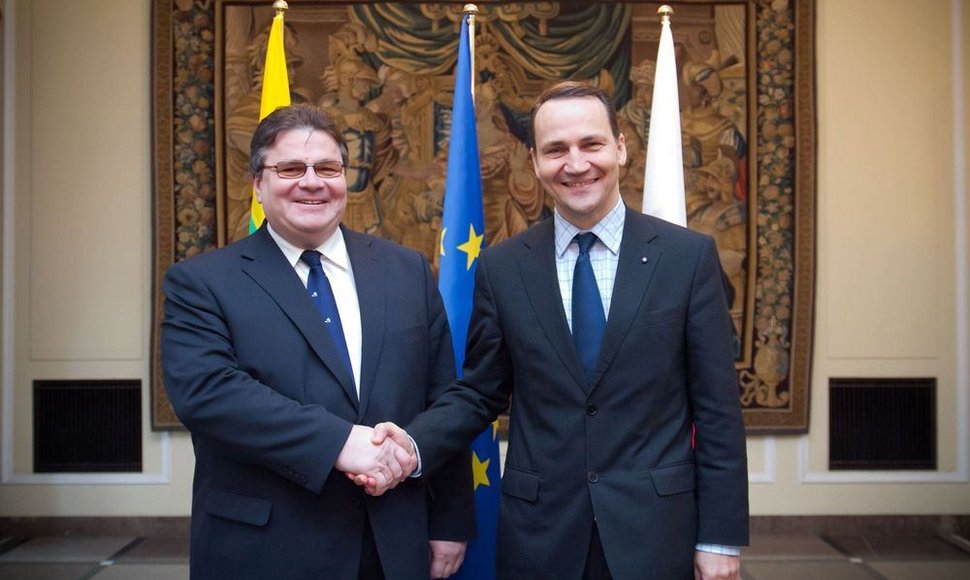"Our objective was to bring the dialogue back on track. The miscommunication has gone on for too long and, frankly speaking, we haven't talked for too long," Linkevičius told BNS after meeting with his Polish counterpart, Radoslaw Sikorski.
In the Lithuanian minister's words, the meeting addressed the European Union's (EU) agenda and bilateral relations including the situation of national minorities.
Asked whether he promised his Polish colleague that Lithuania would pass decisions about the issues raised by Poland – spelling of names, biligual street signs, and education, Linkevičius said that he notified Sikorski about the task force set up at the government to work out relevant amendments.
"I told him we have set up a task force at the government, which includes top-ranking officials from ministries of Culture, Justice, Education and Foreign Affairs who should submit draft amendments in response to the matters," the Lithuanian diplomacy chief told BNS.
"This won't happen fast but should not take a very long time, either. It should be the nearest date possible," he added.
In his words, Sikorski said clearly that it was a domestic matter of Lithuania, and Polish-speaking citizens of Lithuania should not abandon their loyalty to the country.
"The minister said it was our internal matter and he expected Lithuania to do what it had to in order to take care of Lithuanian citizens. I also said that all Lithuanian citizens were important – Lithuanians, Poles, and Russians. The Polish minister emphasized that representatives of the Polish national minority were citizens of Lithuania and had to be loyal to the country they live in. It is a respectable statement," the Lithuanian minister told BNS.
Linkevičius said he raised during the meeting the concerns of Lithuanians who live in Poland over what they say is insufficient education funding, which has led to closure of Lithuanian-language schools and lack of Lithuanian-language textbooks.
The minister pledged to discuss the matters at a meeting with the Lithuanian community in Sejny later on Thursday.
Linkevičius said he had invited Sikorski to visit Lithuania, adding he “accepted the invitation.”
Meanwhile, in an interview to a Polish daily, he apologized for the 2010 vote at the parliament that did not allow original spelling of first and last names in ID documents.
"It is a big disgrace. President Lech Kaczynski was a good friend of Lithuania. Unfortunately, this happened during his visit (in April 2010). I was not a member of parliament at the time but I'd like to apologize," the minister said in an interview published by Rzeczpospolita daily on Thursday.
"The vote shows how complex these matters are. It takes talking and confidence. It was a painful lesson. Our governments now want major changes on the issue of national minorities, however, it is not not clear whether a successful outcome will follow. Let's help each other. I believe it is a shared goal. On behalf of our government, I'm saying we really want to change this," Linkevičius said in the interview.
In April 2010, the Lithuanian parliament voted down the bill which proposed allowing non-Lithuanian alphabet for the spelling of first and last names of Latin origin in ID documents.
Drafted by the center-right government of conservative Prime Minister Andrius Kubilius, the bill was then supported by 30 of Lithuania's 141 parliamentarians, 38 were against and 36 abstained.
The new center-left government has pledged to "resolve the issue of name spelling in ID documents and the issue of spelling of street and location names in compliance with the Framework Convention for the Protection of National Minorities."
The Cabinet also vowed to "seek postponement of the state examination in the Lithuanian language for graduates of non-Lithuanian schools to a later date." Until recently, pupils of Lithuanian- and non-Lithuanian-language schools would sit different graduation exams of Lithuanian. The previous government passed amendments, seeking to unify the exam, which was met by fierce protests from Lithuania's Polish-speaking community.
In Linkevičius' words, relations with EU's Eastern neighbors, primarily Ukraine, was also high on the agenda. He said Vilnius and Warsaw shared the stance on the matters.
This was Linkevičius' third bilateral visit during his term as Lithuania's foreign minister. He went to Latvia and Sweden before.












